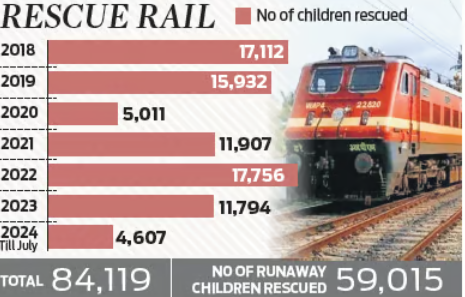18 July 2024 : PIB Summary For UPSC
1. 84,119 Children rescued by RPF under ‘Operation Nanhe Farishtey’ in last seven years
(Source – https://pib.gov.in/PressReleseDetail.aspx?PRID=2033823 )
| Topic: GS2 – Social Justice |
| Context |
|
Analysis of the news:

- ‘Operation Nanhe Faristey’ by the Railway Protection Force (RPF) has rescued a total of 84,119 children across Indian Railway Zones since its inception.
- The initiative aims to protect vulnerable children found in precarious situations on trains and at stations.
- Children rescued include runaways, missing, left behind, destitute, kidnapped, mentally challenged, and street children.
- RPF’s efforts highlight their commitment to child welfare and safeguarding the most vulnerable members of society.
- The operation involves coordinated efforts across railway zones, raising awareness and prompting support from various stakeholders.
- Child help desks at over 135 railway stations and the Track Child Portal facilitate quick response and reunification with families through District Child Welfare Committees.
- Despite challenges like the COVID-19 pandemic, RPF continues to adapt and enhance their efforts to ensure a safer environment for children nationwide.
2. Principal Scientific Adviser to GoI launches report on e-mobility R&D roadmap for India to achieve net-zero targets
(Source https://pib.gov.in/PressReleaseIframePage.aspx?PRID=2033653)
| Topic: GS3 – Indian Economy – Infrastructure |
| Context |
|
Analysis of the news:
- The e-mobility R&D Roadmap for India was launched on July 16, 2024, at Vigyan Bhawan Annexe in New Delhi by Professor Ajay Kumar Sood, Principal Scientific Adviser to the Government of India.
- Objective: The roadmap aims to position India as a global leader in electric mobility within the next five years by focusing on four key areas: Energy Storage Cells, EV Aggregates, Materials and Recycling, and Charging and Refuelling infrastructure.
- Key Focus Areas: Identified through extensive global horizon scanning, the roadmap emphasises reducing import dependency in the e-mobility value chain, strengthening domestic R&D capabilities, and promoting indigenous manufacturing of energy storage systems and renewable energy generation for EV charging.
- Strategic Initiatives: The roadmap outlines strategic initiatives to achieve a 45% reduction in emission intensity by 2030 and energy independence by 2047, ultimately aiming for net-zero emissions by 2070.
- Implementation: Developed under the guidance of CGeM and executed by organisations like Automotive Research Association of India (ARAI) and Non-Ferrous Materials Technology Development Centre (NFTDC), the roadmap integrates technical expertise from academia, government, and industry.
- The roadmap positions India to leverage existing infrastructure and resources for rapid deployment of technologies critical to achieving national energy goals and global competitiveness in the e-mobility sector.
- The event also emphasised the pivotal role of R&D and innovation in aligning the automotive sector’s growth with sustainable development goals, ensuring continued economic contribution while mitigating environmental impact.
| PYQ: The adoption of electric vehicles is rapidly growing worldwide. How do electric vehicles contribute to reducing carbon emissions and what are the key benefits they offer compared to traditional combustion engine vehicles? (250 words/15m) (UPSC CSE (M) GS-3 2023) |
| Practice Question: Discuss the significance of the e-mobility R&D Roadmap for India in achieving global leadership in electric vehicles. How does it address challenges and promote indigenous technological development? (250 Words /15 marks) |





